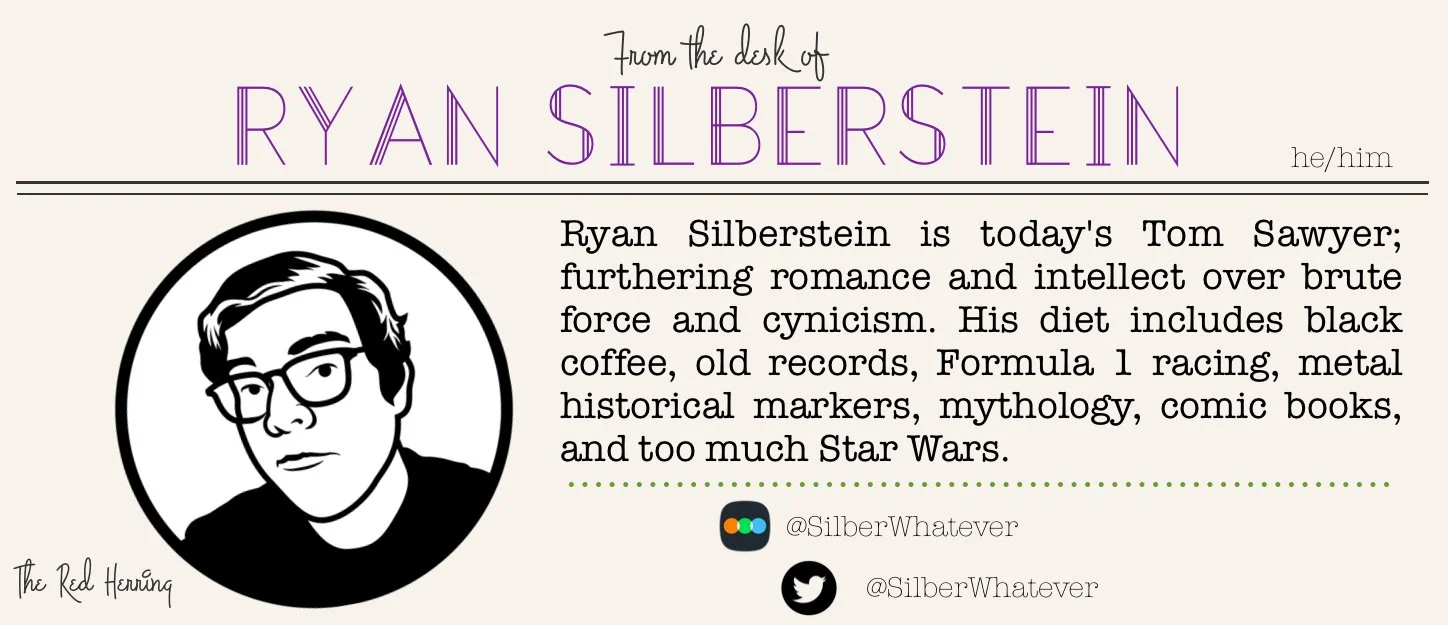OPPENHEIMER is a grandiose, hyperverbal meditation on scientific and political power
Oppenheimer
Written and Directed by Christopher Nolan
Starring Cillian Murphy, Emily Blunt, Matt Damon, Robert Downey, Jr.,
Rated R
Runtime: 3 hours
In theaters July 21 (the same day as Barbie)
by Ryan Silberstein, Managing Editor, Red Herring
Imagine a place
Where it all began
They gathered from across the land
To work in the secrecy of the desert sand
All of the brightest boys
To play with the biggest toys —
More than they bargained for…
–”Manhattan Project” Rush, 1985
Early on in Oppenheimer, the title character (Cillian Murphy) poisons an apple after a professor humiliates him in class. He remembers the poisoned apple the next morning, and rushes back to the classroom, praying that the teacher has not eaten it yet. This time, J. Robert Oppenheimer is able to put the genie back in the bottle. Crisis and its aftereffects are averted. While later efforts to contain the nuclear arms race will not be, this also tells us something about the man. He can be petty, vindictive, and capable of lashing out, but above all, wants to remain kind of aloof. One of the central concerns of Oppenheimer is trying to suss out what exactly is going on in the mind of its main character.
There are many sides to Oppenheimer. Sometimes it feels as though he experiences the world by studying it, learning Dutch or Sanskrit or reading Marx in German because he is searching for something that will explain the world to him. Physics, of course, is fundamentally the search for understanding how the universe works (the physicists I’ve known have said that all science is just applied physics; they also tend to come with egos as vast as their chosen field). Furthermore, the script reminds the audience that alongside Einstein and other scientific revolutions, the tide of change is rising in the early 20th century, as the rise of communism, fascism, and social change are emerging as well. We learn what Oppenheimer has at least considered, and some of his personal values, but often we are shown Murphy’s steel blue eyes and left to ponder what his specific opinions are on any given subject. There are only a few certainties to Oppenheimer–perhaps his affinity for quantum physics was simply his innate desire to hold two opposing thoughts in his head at once–his guilt over the use of the atomic bomb, his belief that the Nazis must be defeated at all costs, and his belief in science/scientists. But when it comes to building the hydrogen bomb, and his personal and political relationships, Oppenheimer remains enigmatic.
And yet Oppenheimer is a deeply emotional work. The importance of Jean Tatlock (Florence Pugh), and her impact on Oppenheimer echo forward to his later feelings of guilt over Hiroshima and Nagasaki. This generates some of the most impactful cinema of Nolan’s career, standing alongside parts of Interstellar, another intellectually-driven man rendered to a near catatonic state due to his inability to process emotions the way he can scientific concepts. There is a moment where Nolan finally escapes the terminal velocity of the material world and lands in a surreal space between the mind and the world outside. For all of the filmmaker’s precision and love of capturing “reality,” this moment is more transcendent than the Trinity test sequence.
Oppenheimer’s relationship with his wife, Kitty (Emily Blunt) and his brother (Dylan Arnold) also come with their own fraught moments. One recurring theme is Oppenheimer’s ethnicity, with Isidor Isaac Rabi (David Krumholtz) bringing up Jewishness as a driving force behind the need to defeat the Nazis. While Oppenheimer identifies as Jewish on an ethnic level, we never see any religious practice at all. While this three hour movie still doesn’t have room for everything, it feels more like lip service than something fully reckoned with by Nolan.
The relationship between science and politics–both personal and policy–is the focus of the film’s final third. Lewis Strauss (Robert Downey, Jr.), the third chair of the U.S. Atomic Energy Commission (AEC), plays a key role in this dynamic in the postwar era. The urgency and stakes of building the atomic bomb were too important for General Groves (Matt Damon) to play too strong of a hand during the war, but when America has to decide what to do about nuclear power–enriched uranium, further testing sites, power plants, responses to the Soviets–politics must come into play. Nolan seems to be unsure whether Oppenheimer was a savvy political navigator or more of a clear-eyed believer, an optimist who actually believed that nuclear weapons could lead to lasting peace.
Oppenheimer is a very talky movie. Most of its scenes involve white men sitting in rooms talking about physics, engineering, warmaking, or political policy. Yet, many of those scenes are as thrilling or fraught as any involving nuclear material. There is an immediacy and urgency in almost every scene, as the stakes have never been higher up to that point in history. In addition, one of Nolan’s major strengths as a storyteller, the way the information is delivered to the viewer, is in full force. The density and nonlinear approach with which it is told allows for effective callbacks, repetition, and severely delayed resolution. One or two of them in particular do feel like your mind is splitting atoms, with how note-perfect the reveals are. The end result feels so effortless and organic that viewing Oppenheimer makes you feel like an instant expert on nuclear policy. By the time the political maneuvering is happening, everything seems twisted around and perverted by the shadow of Hiroshima and Nagasaki, but the Cold War must be reckoned with as well. How many world-ending devices does one country need? We’re all MAD (mutually assured destruction) here.
Like much of Nolan’s work, Oppenheimer is a study in causality. This is the first time the writer-director has taken on a biopic, but the approach is the same as his previous films. What caused the bomb to be invented, and what was the effect? Was fighting fascism in Spain the reason Oppenheimer was a communist sympathizer, or what it the result? Some of the causes are unknowable. Did Oppenheimer turn Einstein against Strauss? What was the cause of Oppenheimer humiliating Strauss at a previous hearing? We don’t know, but we certainly see the effect.
Based on the book American Prometheus by Kai Bird and Martin J. Sherwin, and Prometheus–who stole fire from Olympus and gave it to humans–is another core theme of the film. Also analogous is the apple in Eden–the apple that the serpent promises Eve will open her eyes and grant her knowledge of good and evil–once obtained this knowledge can not be unknown. Both Prometheus and Eve were punished for unleashing this knowledge on the world. Was Oppenheimer? Did he know the only way to unlock the practicality of physics was to inject the poison of war into that apple of knowledge?
In some ways, Oppenheimer is a mirror of Tenet, as the McGuffin of that film is also about a destructive weapon that could destroy the world, with the physics of time being themselves an extension of quantum theories. Furthermore, per Tom Shone’s book, The Nolan Variations, Robert Pattinson gifted Nolan a collection of Oppenheimer’s postwar speeches at the wrap party for Tenet. When asked about Oppenheimer by Shone, Nolan opines:
It's eerie reading, because they're wrangling with this thing they've unleashed. How's that going to be controlled? It's just this most monstrous responsibility. Once that knowledge is out there in the world, what can you do? You can't put the toothpaste back in the tube. It was a savvy, thoughtful wrap gift, actually, because, like you, I've grown up in the postnuclear age. In Graham Swift's Waterland, there's a whole section about apocalyptic thinking. We've grown up in the shadow of the ultimate destructive knowledge.
Oppenheimer himself could be the prime mover of Nolan’s universe, the inventor of the modern world. When light can be both a wave and a particle, what chance does the truth have? Nolan of course structures the film as ping ponging back and forth across time, with Oppenheimer’s perspective being the major unifying force, but is also knowable. Oppenheimer is known and unknown. Two opposite yet observable truths.
The use of the atomic bomb is something all Americans must internalize about our place in the world. America is the only power to ever detonate such a device in an act of war. This is in addition to the ecological and biological harm caused by testing nuclear weapons, a responsibility we must also bear. Our accountability carries forward in time beyond those who actually made the decisions. Like many of America’s other atrocities, it is continually swept aside or framed only in the most nationalistic of terms. Those displaced by Los Alamos, those impacted by the underestimate around radioactive fallout, and those killed or poisoned by the attacks on Japan are the unseen victims of the story. Bombing Hiroshima and Nagasaki with atomic weapons were crimes against humanity, and against nature. We don’t see them here, but the guilt that haunts Oppenheimer is vividly depicted, and should be the guilt that haunts us all. You can’t unpoison an apple.


